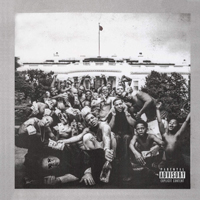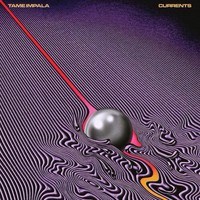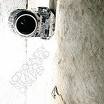|
|||||||||||||||||
|---|---|---|---|---|---|---|---|---|---|---|---|---|---|---|---|---|---|
| MUSIC | MIXES | SIXX MIXX | INFO | PRESS | CHARTS | CONTACT | |||||||||||
So as devotees of Party Ben Year-End Charts no doubt are aware, there are rules regarding eligibility for and the formation of these lists. This is serious you guys! The most important rule is that the chart must be set in stone at midnight on New Year's Eve, and if my opinion changes later on, or it turns out I missed an album entirely, well that's just too bad there hot shot. This means the charts end up as snapshots of a moment in time, which can be nice, but also means misstepps and omissions are etched in internet stone. Let's take a look back, shall we? Historical charts are on the right, and hmm, I missed Amadou & Mariam in 2004, maybe Kid A shoulda beat the Sophtware Slump back in 2000, and maybe Dizzee Rascal is a bit high at #3 in 2003. More recently, totally missed late-year releases from Beyonce and D'Angelo, and for the 2009 album charts, I think it's clear that the debut album from The xx, which I placed at #2, should switch places with Animal Collective at #1. I was under the sway of the unassailbly stupendous AC single "My Girls," and in comparison to the Collective's dense, layered soundscapes, The xx and their deadpan minimalism seemed less serious or important or something? Who knows what I was thinking, but let's be honest: I haven't listened to that Animal Collective album once since then, and that xx album, on the other hand, seems more vital and relevant with every passing year. At my job at internet radio concern Pandora, it has become a bit of a joke that The xx's "Intro" shows up everywhere, on stations you wouldn't think it had a connection to--people thumb that song up wherever they hear it. It turns out that The xx's minimalism wasn't simplicity, it was universality, a clear path to the heart and the soul. In the intervening years, bandleader Jamie Smith (proudly taking his band's name in NME-style marriage) has expanded his musical palette as a solo artist, but has always maintained that direct line to the soul in everything he's produced. Like their brilliantly designed covers (always featuring just one arm of the four-armed "X") singles like "Far Nearer" and "I'll Take Care of You" have seemed to explore new musical "hues" (tropical pink for the former, deep sympathetic green for the latter). Music has always evoked colors for me, and so how fitting, how lovely, that In Colour's cover (and contents) refract into the entire spectrum. It's the most awesome album-cover rainbow since Dark Side of the Moon, and while coincidental, it seemed meant to be that it was released within weeks of the Supreme Court's ruling removing restrictions against same-sex marriage. Although, I'm reminded of a classic "This American Life" which featured Sarah Vowell learning about goths, who explained the concept of "the pink of goth," in that the most gothy goth could wear pink and still be, in fact be even more goth; well, Jamie xx can explode a whole rainbow all over his album and still be sad. I'll talk about the two big singles, "Loud Places" and "Good Times," more below in the song section, but they both exemplify the delicate balance at play here, using the brightest palette to paint a picture of melancholy. "Loud Places" revels in the memory of ecstasy just as it cries out in anguish--"I have never reached such heights!"--and "Good Times" of course brings a welcome note of optimism even while it languidly acknowledges things may not be so great right now. I think it's a familiar state to those of us who know heartbreak and loneliness: it's not like pain removes or muffles beauty; on the contrary, joy is right there next to it, out of reach but plainly visible. Second-to-last track "The Rest is Noise" appears to reference New Yorker music critic Alex Ross' acclaimed book of the same name (which itself nods to Hamlet's final words "the rest is silence") which, in Ross' words, was his way of acknowledging "the perception that classical composition devolved into noise as the twentieth century went on." It's a reminder of how often the sounds on In Colour are strange, unconventional, buzzy and twisting and bending, upending expectations, something that's easy to forget as you're enveloped in the emotion of it all. If In Colour starts audaciously, it ends even more boldly, almost as a testament to the importance of experimental sound and a connection to the history of modern, and modernist, music. Is Jamie xx a new Gustav Mahler or, um, Steve Reich? Well, who's to say, but In Colour is clear evidence that the intertwining of popular and experimental musical traditions has never been more electrifying, kaleidoscopic, and stirring.
The sentiment in the final sentence of my Jamie xx review above carries over completely to this album, which also explicitly meshes the most innovative and pioneering sounds with contemporary popular styles (in this case, hip hop). Another Thing I Would Do Differently from the history of Party Ben Charts is the position at #10 of Lamar's 2012 single "Swimming Pools (Drank)," which I would probably now put at #2 right behind Grimes if I could revise it, as that Pools' haunting electronic washes and indictment of substance abuse still give me chills to this day. This year, Lamar has moved away from those chilly electronic sounds and made a jazzy, funky, rocking, wide-ranging masterpiece, and one whose message thrillingly reached all the way to the White House, as President Obama called "How Much a Dollar Cost" his favorite song of the year. While a record with so much connection to the history of the black experience couldn't help but be political in an era where the remaining strands of institutional racism seem to be convulsing into endlessly repeating eruptions of heartbreaking violence, it's a testament to Lamar's vision that this album is, even with its moments of rightous anger, hopeful and personal overall—as Pitchfork put it, he's the "grounded black hippie.""I love myself," goes "i," over an instantly recognizable but unmistakably elevated Isley Brothers sample, exhorting you to "lift your head up and keep moving," but "Blacker the Berry" (also a literary reference, here to a 1929 book of the same name by Wallace Thurman, about light- vs dark-skin racism within the black community) doesn't shy away from black-on-black violence. However the focus is still, always, within. "I'm the biggest hypocrite of 2015," he says, spitting stereotypes and history, but coming to the exhausted conclusion, familiar to anyone suffering under injustices that reach back farther than you can imagine, that to fight, and to fly, you first have to stand up.
Watching (well, hearing) the evolution of Tame Impala (aka Perth's Kevin Parker) has been one of the most exciting and rewarding musical journeys of the 2000s. I'm almost suspicious that he's been reading my musings about him on these very charts on this very website. Exhibit A: In putting 2010's Innerspeaker at #5, I lauded the connection of psychedelia's insularity with a lyrical focus on solitude, but wondered if it really brought anything more to the table than its long line of hallucinatory forebears from the Beatles to Dungen. Well, Mr. Parker, you sure showed me, as 2012's Lonerism expanded into studio wizardry and electronics. In naming that my album of the year, I noted with excitement a whiff of the Chemical Brothers, and now, boom Currents is Tame Impala's full-blown electronic album, with guitars all but abandoned for synthesizers, drum machines, and astute DJ-style trickery. "The Moment" swirls with mixer effects and a CD wind-down, and "Past Life" buzzes with Com Truise-style tones and distortion. The lyrical theme is expansive and thoughtful as well, Track 4 acknowledges, in the understatement of the year, "Yes I'm Changing," and "Let It Happen" is all about transformation. Of course "Let It Happen" will be discussed more below. I will say that like previous examples of albums utterly dominated by masterpiece singles (at Track 1 here no less), it does serve to make the rest of the album pale ever so slightly in comparison. That quibble aside, this all brings me back to the Chemical Brothers, who explicitly made the psychedelic experience their agenda, and while they came at it from techno and Public Enemy, it's amazing to see Tame Impala come at it from navel-gazing psyche rock and end up in that same thrilling and mind-expanding zone.
British producer George FitzGerald has created something similar to Jamie xx's In Colour: an album based on dance music, stylistically adventurous, and yet suffused with heartbreak. To distinguish it I might say Fading Love is more focused, as if extracting just the bluish-grey tone from In Colour's rainbow. FitzGerald comes from straight ahead dance culture, UK house and garage and the minimalism and techno of his adopted Berlin, and Fading Love is unapologetically four-to-the-floor. "Call It Love" has the kick, bassline and synth pads of much deep house, sure, but it deploys these tools as the accompaniment to lyrics that sound like excerpts from an argument in a Raymond Carver short story: "And if you say it's not enough, then it's not enough," and the beat eventually takes a backseat to thrilling, disorienting, stuttering chords. There's no discomfort with the "restrictions" of dance music here, on the contrary—it's a deep confidence in the ability of dance music to go to these surprising and sorrowful depths.
While I'm as big a fan of any of the "verite" recordings of African music, including the Malian work of Yaala Yaala and Congolese artists like Konono No 1 or Kasai Allstars, it's also interesting when there's an actual cross-cultural musical exchange as opposed to just documentation. Fascinatingly, Mbongwana Star consists of not only esteemed Congolese musicians, but also Liam Farrell, the erstwhile drummer for oddball French pop combo (and young Party Ben favorite) Les Rita Mitsouko. What has emerged is both recognizably African and profoundly new and strange. "Nganshe" has the traditional chiming guitar tones of much Afropop but also features an insistent bass stomp and a completely baffling warbling scrapey tone echoing throughout, and eventually gets a clattering bleep of what sounds like a malfunctioning cash register. World music still so often describes pretty, reassuring, massage-room wallpaper, and when you dip your toes into international waters, you can run the risk of getting, well, Thievery Corporation (shudder). But From Kinshasa is both deeply authentic and profoundly experimental.
Not to brag (and it's not bragging because I don't feel like I did anything to get it) but I have a pretty good sense of direction. I can spin around in unfamiliar cities and still have a general idea where north is and how to get to the subway station or whatever. So there's a sublime thrill for me to actually be lost, and I remember those moments vividly. It happened to me once a few years ago in Prague: as I wandered the old town's tiny crooked alleyways, I realized giddily that I had no idea which way was north, or where I was at, in general, and although I knew that if I kept walking I'd eventually find something familiar and I was fine, I savored the moment of disorientation, unfamiliarity. That's sometimes how I feel hearing music I don't know anything about, and why Multi-Love is a late entry into my year-end chart. I guess UMO are a New Zealand/Oregon combo, but I knew nothing about them, dove into this album on a recommendation and found myself engulfed in something wonderful: a weirdly retro take on classic R&B pop filtered through psychedelia and the crunch of garage rock, drizzled with electronica. In its timeless quirkiness, I guess it reminds me of The Magnetic Fields, who even when they sound like a traditional rock band turn out to be making those sounds with like plungers and mellotrons and God knows what, or Beck, who seems to have all of music history in quotes even as he imbues existing styles with new emotions. The theme of polyamory floats in and out of the often sultry grooves here, and while that may be a bit heady (or gross) for some, there's an absolute universality in the longing and bafflement on display: "I Can't Keep Checking My Phone" isn't a sentiment reserved for the amorously avant-garde, and its strangely familiar disco strut is a perfect accompaniment, somehow reminding you that love can be a comedy of errors.
Unlike George Fitzgerald above or Bob Moses below, London producer Sam Shepard (aka Floating Points) doesn't hesitate to throw off the restrictions of dance music on his debut album, which seems to nod towards avant-garde composers and jazz as much as towards current dance trends. It's sometimes nearly ambient, as opener "Nespole" consists of flittering bits of buzzy melodies until a bassline emerges to unify them, and finale "Peroration Six" utilizes live drums and guitar in service of an ominous post-rock soundscape. Shepard built a harmonograph to create the cover art—similarly to those doctor's-office coffee table doodads with a swinging pointer that draws patterns in sand, a harmonograph utilizes a pendulum to draw a geometric image, rendering harmonics beautifully visual, if you're patient enough to wait for it to swing through its pattern. Similarly, patient listeners will find Elaenia describes a cohesive whole, hypnotic and timeless.
On the surface, both Days Gone By and Fading Love utilize the building blocks of house music to paint pictures of melancholy. But there's something a bit darker in the music of Bob Moses. Opener "Like It Or Not" lets the bass-heavy beat thump along for a good two minutes before the lyrics even come in, and when they do, it's just to advise that "there isn't much that you can do." "Too Much Is Never Enough" seems to evoke deep house played in a room next door, with the thudding kick and piano muffled and far away. While I’m less of a fan when they get ballady, the triple-time "Tearing Me Up" is emotional and affecting, with its hypnotic guitar line and admission that "I guess there's no catching up to you." The unifying themes are the insistent kick and the haunting piano, both part of house from the beginning, and both equally at home illustrating remorse.
Album of the Year, an essential site for nerds like myself that catalogs year end lists, categorizes Grimes as "Art Pop," which has vaguely terrifying Lady Gaga implications. What's different about Art Angels is that it shakes off all convention, lyrically and musically, and is clearly an individual artistic statement, but yet it remains instantly accessible. It's a surprising turn of events for an artist who started out as a critically acclaimed but still obscure gothy electro weirdo, and then took a startling right turn into straight up trap music, then threw out most of what was an apparently completed followup album. Here, her competing impulses all seem to balance beautifully: the majestic "Flesh without Blood" somehow marries pure pop appeal with edginess and darkness, and "California" inverts the traditional hymn to the golden state: "California, you only like me when I'm looking sad." I know that feeling. Like Jamie xx, the album is so bold and yet so appealing that it seems to reorient what we think of as mainstream around itself.
I guess it's proof of the maturity of house music that so many artists have made groundbreaking albums this year by either exploring what new places house music can go, or blowing up its traditions entirely. Hunee, AKA Amsterdam-based Dan Choi, created one of the most purely enjoyable albums of the year, reminding me of the atmospheric and hypnotic work of Leon Vynehall, given room to breathe. "Rare Happiness" combines a swirling, almost Disney-esque sample with a chugging groove and vocal sample, creating something delightful and infectious. Whether he slows things down or gets a little deeper, there's an easygoing charm to Hunch Music that belies its uniqueness, and it was playing in my house as much as anything this year. 11. Courtney Barnett - Sometimes I Sit And Think, And Sometimes I Just Sit 
I probably use the word "thrill" a bit too much in my end-of-year charts, but Thesaurus.com only offers "fun" and "wallop" as similar options, and honestly, a thrill is really what the best new music gives me, and no song this year was as thrilling as "Let It Happen." Released in March in advance of the new album, "Happen" was an awe-inspiring statement of intent, making clear that the foray into electronics hinted at on Lonerism had come to complete fruition. The song starts somewhat unassumingly. It establishes a "Get Your Rocks Off" four-four beat that nods to dance music but relies more on the snare than the kick, with an insistent single note staccato synth tone that nods to "Trans Europe Express" or Madonna's "Music." From those humble beginnings, in its seven minutes it achieves a hypnotic majesty that made me start it up over again and again in complete bafflement and ecstasy. Tame Impala have always impressed me with matching their musical and lyrical agendas (navel-gazing isolation with psychedelia's solipsism, for instance) and what's truly amazing about "Let It Happen" is that it sonically illustrates its lyrical point of metamophosis, of change. Parker sings about a "whirlwind that's coming round" that's "gonna carry off all that isn't bound," the anxiety and fear of the unknown. Then, musically, the song does something I've never heard before: utilizing his newfound appreciation for DJ-style effects, around the three minute mark, suddenly, there's a weird skip, and then another. What is happening? The track starts to turn in on itself, like a CD skipping, or a DJ trying to establish a loop, and finally, it's stuck. What is going on? Then, miraculously, dramatic strings come in on top of the loop, and then drums: there's a new song starting on top of the existing song, which expands and swells, pushing the loop into the background until the new (old?) song is back, in a moment giddier and more exhilarating than any EDM drop. I have no real idea how he accomplished this: did he record the whole song, then establish the loop and then perform the second song on top of it? Are there two songs in this song?!! However it was done, it's an incredible statement: your song, like your life, can stutter and stumble and seem to get stuck, but have faith, let it happen, and you can emerge on the other side, whole, and even perhaps improved.
While 2011's "Far Nearer" made clear Jamie xx's ability to construct a sunny pop song that felt both nostalgic and brand new, "Good Times" confidently connects the dots to dancehall, recruiting Haitian Young Thug and Jamaican Popcaan for effortlessly smooth vocal duties, and deploying a Persuasions sample perfectly, in the traditional dance music style of transforming the original's initial major chord into a minor seventh. It feels both completely natural and a million miles from The xx's chilly debut album, and it achieved a kind of insane and yet totally understandable bit of mainstream success on hip hop radio. More than anything, it's a rare sunny pop song that seems to have earned its cheer authentically, and seems to acknowledge that maybe the good times are about as far away as you can imagine, but it's holding on to the belief that they're coming that's most important.
It's tempting to compare "Flesh Without Blood" to Taylor Swift's "Shake It Off," which shares its double time beat, sonic density and pop aspirations, but Grimes proves that when you don't have Max Martin or a committee of producers and writers creating your music for you, you can make pop music that's both ridiculously pleasurable and a totally personal artistic statement. The Taylor Swift comparisons continue as "Blood" seems to be about the dissolution of a friendship, but Grimes' declaration "now I don't care anymore" is far more devastating and real than a million "Blank Spaces."
It's telling that the infectious "we gon be alright" chorus is sung by the guy who produced "Happy," but in the verses, Lamar details a laundry list of travails, from the police to depression, making this song both entirely of the moment and somehow eternal. What's incredible is that the song feel so natural and accessible, while at the same time its beat is so obscured, with the kick at odd points and the in-and-out choir singing an unresolved chord. It's 4/4 but at times feels like 3/4 alternating with 2/4, totally hard to keep track of, making the breakneck rap all the more impressive.
It's a testament to the resurgence of hip hop that a song this, well, silly (and which became completely inescapable) is also totally avant-garde, with its weird loungey Timmy Thomas organ sample and James Turrell-inspired video (nearing 300 million views). It wouldn't have worked if Drake appeared to be trying at all—there's something so casual and conversational about the lyrics, it's barely singing or rapping, it's just sort of talking, and of course I don't even need to mention how casual his dancing is. But I think it's that ease and effortless, relaxed tone that somehow allowed this weird bit of freaky audio to worm its way into the human race's collective brain. Honestly it feels strange to even include this on a "songs" list, since "Bling" in its many cover versions and homemade videos is better described as some sort of media phenomenon: a meme unto itself.
While "Good Times" was the breakout hit from In Colour that seemed to sum up the album's kaleidoscopic diversity, it's "Loud Places" that was its true emotional center. With the detachment of heartbreak, Jamie xx's former bandmate Romy sings with a kind of bafflement at the actions of humans: clubs, these loud places, where we look for someone to be quiet with.
Progressive house has always been kind of a secret guilty pleasure of mine. It's kind of like ice cream, you don't look for surprises, but sometimes the perfectly designed hypnotic soundscape of sweet chords just hits the spot. Duo CamelPhat don't really make progressive house—their 2014 track "The Act" sort of balanced tech and deep house while remaining deeply weird—and that's probably why this track is so good. It doesn't rely on big fat chords but just a straightforward two note pattern that nevertheless creates such a sense of propulsion and uplift that I assumed its music video would be rockets taking off or something (of course it ended up just being some dopey girl walking around a beach, and it's *not* embedded above).
I know, weird, right? Well, in 1997, my #2 album of the year was the epic Perfect from Now On by Built to Spill, and there's something reminiscent of that album's scale and tone in "Black Sun." While the lyrics flirt with cliché at times ("there's a song yet to be sung,") at other times they are profound, strange, and affecting, visions of a "desert veiled in pavement" and an admission that "there is grace within forgiveness/but it's so hard for me to find." Amen, sister.
While far less ambitious than Animal Collective's now-legendary "My Girls," "Boys Latin" has some of the same multi-layered sonic texture, the same weird balance of electro-modern and oddly mythical. There's not much lyrically I can decipher but there is a super trippy video that appears to be about some hallucinatory plant-monster universe but I choose to interpret as (stay with me) a gay couple adopting a child, which when I look at it that way is really quite touching, sorry I'm getting a little bit verklempt, talk amongst yourselves, I'll give you a topic, Panda Bear is neither a Panda nor a Bear, discuss.
A track that needed all of its original 9 minutes to be truly effective but worked just fine in its various edits and remixes (especially that HNNY one). There were no more exciting and hypnotic piano chords in house music this year. 11. Kelela - Rewind Honorable Mention:
|
|
||||||||||||||||||||||||||||||||||||||||||||||||||||||||||||||||||||||||||||||||||||||























 1. Caribou - Our Love
1. Caribou - Our Love 1. Future Islands - Seasons (Waiting on You)
1. Future Islands - Seasons (Waiting on You) 1. Kanye West - Yeezus
1. Kanye West - Yeezus 1. Daft Punk - Get Lucky
1. Daft Punk - Get Lucky 1. Tame Impala - Lonerism
1. Tame Impala - Lonerism 1. Grimes - Oblivion
1. Grimes - Oblivion 1. PJ Harvey - Let England Shake
1. PJ Harvey - Let England Shake 1. Gil Scott Heron & Jamie xx - I'll Take Care of You
1. Gil Scott Heron & Jamie xx - I'll Take Care of You 1. KANYE WEST - My Beautiful Dark Twisted Fantasy
1. KANYE WEST - My Beautiful Dark Twisted Fantasy 1. LCD SOUNDSYSTEM - Dance Yrself Clean
1. LCD SOUNDSYSTEM - Dance Yrself Clean 1. ANIMAL COLLECTIVE – Merriweather Post Pavillion
1. ANIMAL COLLECTIVE – Merriweather Post Pavillion

 1. LCD SOUNDSYSTEM Sound of Silver
1. LCD SOUNDSYSTEM Sound of Silver 1. Rihanna – "Umbrella"
1. Rihanna – "Umbrella" 1. J DILLA Donuts
1. J DILLA Donuts 1. GNARLS BARKLEY "Crazy"
1. GNARLS BARKLEY "Crazy" 1. M.I.A. Arular
1. M.I.A. Arular 1. GORILLAZ "Feel Good Inc."
1. GORILLAZ "Feel Good Inc."
 1. FRANZ FERDINAND "Take Me Out"
1. FRANZ FERDINAND "Take Me Out"  1. THE WHITE STRIPES Elephant
1. THE WHITE STRIPES Elephant 1. OUTKAST "Hey Ya"
1. OUTKAST "Hey Ya" 1. THE STREETS Original Pirate Material
1. THE STREETS Original Pirate Material 1. THE WHITE STRIPES "Fell in Love with a Girl"
1. THE WHITE STRIPES "Fell in Love with a Girl" 1. Low Things We Lost in the Fire
1. Low Things We Lost in the Fire  1. Missy Elliott - Get Ur Freak On
1. Missy Elliott - Get Ur Freak On 1. GRANDADDY The Sophtware Slump
1. GRANDADDY The Sophtware Slump 1. Zombie Nation
1. Zombie Nation  1. The Magnetic Fields 69 Love Songs
1. The Magnetic Fields 69 Love Songs

